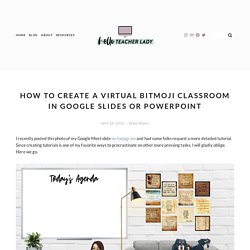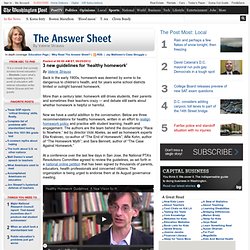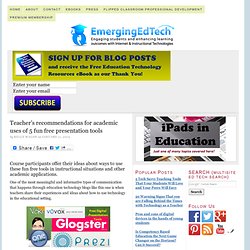

Jennifer
Literacy coach for a K-5 Bilingual elementary
How to Create a Virtual Bitmoji Classroom in Google Slides or PowerPoint — Hello, Teacher Lady. If you want to create a Google Meet or Agenda slide like mine (or something similar), you can keep the default page dimensions and move onto Step 2.

If you want to create a Google Classroom header, change the page dimensions to 1,000 x 250 pixels by going to File —> Page Setup in Google Slides or Design —> Page Setup in PowerPoint. Just a warning though: When you upload your banner on Google Classroom, you’ll get this frustrating dark overlay on your image. It’s an accessibility thing and can’t be changed, so just keep that in mind and try to keep everything as bright as possible.
To create a custom Google homepage, you’ll want the dimensions somewhere in the neighborhood of 15 in x 8 in. Next step is to collect the images for your scene. For mine, I used posters from ECHO-LIT (my favorite poster shop) and a variety of Google Images.
EJ1080086. How states can reimagine teacher preparation to ensure edtech skills. How states can reimagine teacher preparation to ensure edtech skills. Virtual learning framework. Communications Role for PGE. iPad App. Family. Recipes. Me - Personal and collaborative sticky notes web-app. Classroom ideas. 3 new guidelines for ‘healthy homework’ - The Answer Sheet. Back in the early 1900s, homework was deemed by some to be dangerous to children’s health, and for years some school districts limited or outright banned homework.

More than a century later, homework still drives students, their parents and sometimes their teachers crazy — and debate still swirls about whether homework is helpful or harmful. Now we have a useful addition to the conversation. Below are three recommendations for healthy homework, written in an effort to realign homework policy and practice with student learning, health and engagement. The authors are the team behind the documentary “Race to Nowhere,” led by director Vicki Abeles, as well as homework experts Etta Kralovec, co-author of “The End of Homework”; Alfie Kohn, author of “The Homework Myth”; and Sara Bennett, author of “The Case Against Homework.” Here are the homework guidelines: Educators at all grade levels should assign homework only when: • At-home reading chosen by the student.
Kalbarteski — Home. Literacy-Reading. PBL. Internet Safety. Bullying. Infographic. Audience Response Systems. Data. Teacher’s recommendations for academic uses of 5 fun free presentation tools. Course participants offer their ideas about ways to use these fun free tools in instructional situations and other academic applications.

One of the most meaningful and informative types of communication that happens through education technology blogs like this one is when teachers share their experiences and ideas about how to use technology in the educational setting. Last summer, EmergingEdTech ran an online workshop in which participants learned about a variety of free digital presentation tools. With each tool, we got hands-on and created brief presentations, and then discussed our experiences and shared ideas on how we might use these tools in our professional roles. The participants shared a lot good ideas, and I’ve been meaning to share some of them here. Following are some of the tools we used, and some of the ideas offered for how to put them to use in education. “We are starting a new early college high school program. “… classroom ideas for Glogster use: Vuvox About Kelly Walsh.
Picturing to Learn - Misconceptions in Science.
Lathrop Tools. Pinterest. Dropbox. Classroom management. RtI. How to Use Google Search More Effectively [INFOGRAPHIC] Among certain circles (my family, some of my coworkers, etc.)
![How to Use Google Search More Effectively [INFOGRAPHIC]](http://cdn.pearltrees.com/s/pic/th/google-effectively-infographic-127984952)
I'm known for my Googling skills. I can find anything, anywhere, in no time flat. My Google-fu is a helpful skill, but not one that's shrouded in too much mystery — I've just mastered some very helpful search tricks and shortcuts and learned to quickly identify the best info in a list of results. Sadly, though web searches have become and integral part of the academic research landscape, the art of the Google search is an increasingly lost one. A recent study at Illinois Wesleyan University found that fewer than 25% of students could perform a "reasonably well-executed search.
" That search process also included determining when to rely on Google and when to utilize scholarly databases, but on a fundamental level, it appears that many people just don't understand how to best find the information they seek using Google. Thanks to the folks at HackCollege, a number of my "secrets" are out. Infographic via HackCollege.
School Improvement. Teacher Tools. Assessment. Pearltrees videos. Help.